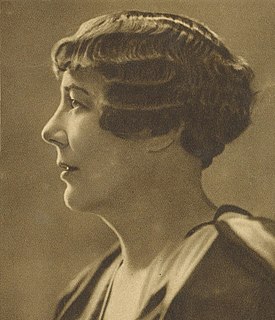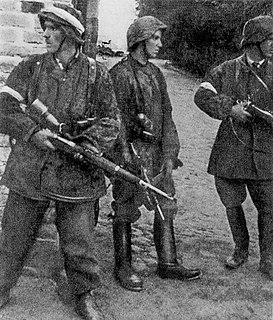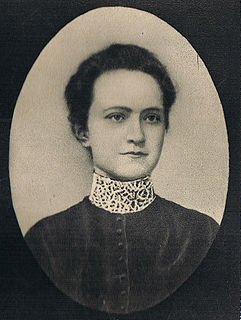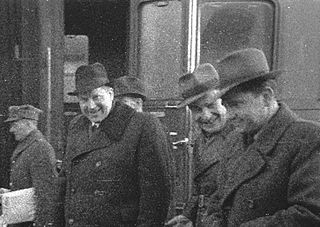Related Research Articles

Jan Karski was a Polish soldier, resistance-fighter, and diplomat during World War II. He is known for having acted as a courier in 1940–1943 to the Polish government-in-exile and to Poland's Western Allies about the situation in German-occupied Poland. He reported about the state of Poland, its many competing resistance factions, and also about Germany's destruction of the Warsaw Ghetto and its operation of extermination camps on Polish soil that were murdering Jews, Poles, and others.

Zofia Kossak-Szczucka was a Polish writer and World War II resistance fighter. She co-founded two wartime Polish organizations: Front for the Rebirth of Poland and Żegota, set up to assist Polish Jews to escape the Holocaust. In 1943, she was arrested by the Germans and sent to Auschwitz concentration camp, but survived the war.

Żegota was the Polish Council to Aid Jews with the Government Delegation for Poland, an underground Polish resistance organization, and part of the Polish Underground State, active 1942–45 in German-occupied Poland. Żegota was the successor institution to the Provisional Committee to Aid Jews and was established specifically to save Jews. Poland was the only country in German-occupied Europe where such a government-established and -supported underground organization existed.

Irena Stanisława Sendler, also referred to as Irena Sendlerowa in Poland, nom de guerreJolanta, was a Polish humanitarian, social worker, and nurse who served in the Polish Underground Resistance during World War II in German-occupied Warsaw. From October 1943 she was head of the children's section of Żegota, the Polish Council to Aid Jews.

Righteous Among the Nations is an honorific used by the State of Israel to describe non-Jews who risked their lives during the Holocaust to save Jews from extermination by the Nazis for altruistic reasons. The term originates with the concept of "righteous gentiles", a term used in rabbinic Judaism to refer to non-Jews, called ger toshav, who abide by the Seven Laws of Noah.

The Kraków Ghetto was one of five major metropolitan Nazi ghettos created by Germany in the new General Government territory during the German occupation of Poland in World War II. It was established for the purpose of exploitation, terror, and persecution of local Polish Jews. The ghetto was later used as a staging area for separating the "able workers" from those to be deported to extermination camps in Operation Reinhard. The Ghetto was liquidated between June 1942 and March 1943, with most of its inhabitants deported to the Belzec extermination camp as well as to Płaszów slave-labor camp, and Auschwitz concentration camp, 60 kilometres (37 mi) rail distance.

The Provisional Committee to Aid Jews was founded on September 27, 1942, by Zofia Kossak-Szczucka and Wanda Krahelska-Filipowicz. The founding body consisted of Polish democratic Catholic activists associated with the Front Odrodzenia Polski, Polska Organizacja Demokratyczna, Związek Syndykalistów Polskich and PPS-WRN. The codename for the organization was "Konrad Żegota Committee" and the same codename was retained for the direct successor, the underground Council to Aid Jews.

Wanda Krahelska-Filipowicz, code name “Alinka”” or “Alicja”, was a leading figure in Warsaw’s underground resistance movement throughout the years of German occupation during World War II in Poland, co-founder of Żegota. As the well-connected wife of a former ambassador to Washington, she used her contacts with both the military and political leadership of the Polish Underground to materially influence the underground's policy of aiding Poland's Jewish population during the war.

Szmalcownik ; in English, also sometimes spelled shmaltsovnik) is a pejorative Polish slang expression that originated during the Holocaust in Poland in World War II and refers to a person who blackmailed Jews who were in hiding, or who blackmailed Poles who aided Jews during the German occupation. By stripping Jews of their financial resources, blackmailers added substantially to the danger that Jews and their rescuers faced and increased their chances of getting caught and killed.

Julian Grobelny was an activist in the Polish Socialist Party (PPS) from 1915, in the lead-up to Poland's return to independence. During the interwar period he was a social activist. After the German-Soviet invasion of Poland in 1939, and the ensuing Holocaust, he became President of Żegota active in the General Government territory of occupied Poland. The clandestine organization was named after a fictional character Konrad Żegota born on the exact day of its inception in 1942. Grobelny served as president of Żegota until the end of hostilities.

Ferdynand Marek Arczyński, cryptonym "Marek" or "Lukowski", was one of the founding members of an underground organization Żegota in German-occupied Poland, from 1942 to 1945. Żegota's express purpose was to help the country's Jews survive the Holocaust; find places of safety for them, and provide relief payments to thousands of families. Poland was the only country in occupied Europe with such an organization during World War II.

Polish Jews were the primary victims of the German-organized Holocaust in Poland. Throughout the German occupation of Poland, many Poles rescued Jews from the Holocaust, in the process risking their lives – and the lives of their families. Poles were, by nationality, the most numerous persons who rescued Jews during the Holocaust. To date, 7,177 ethnic Poles have been recognized by the State of Israel as Righteous among the Nations – more, by far, than the citizens of any other country.
Jerzy and Irena Krępeć, a Polish husband and wife, living in Gołąbki near Warsaw during Nazi German occupation of Poland in World War II, were the Righteous who rescued Polish Jews with families including refugees from the Ghetto in Warsaw during the Holocaust.

The Częstochowa Ghetto was a World War II ghetto set up by Nazi Germany for the purpose of persecution and exploitation of local Jews in the city of Częstochowa during the German occupation of Poland. The approximate number of people confined to the ghetto was around 40,000 at the beginning and in late 1942 at its peak, immediately before mass deportations, 48,000. Most ghetto inmates were delivered by the Holocaust trains to their deaths at the Treblinka extermination camp. In June 1943, the remaining ghetto inhabitants launched the Częstochowa Ghetto uprising, which was extinguished by the SS after a few days of fighting.

Leon Feiner was a Polish-Jewish lawyer, an activist of the General Jewish Labour Bund in Poland and between November 1944 and January 1945 the director (prezes) and vice-chairman of the Council to Aid Jews "Żegota".

Stanisław Henryk Krzyżanowski was a Polish physician. Alternate birth (1877) and death dates are given on the Otwock-History blog. He was among the earliest members of the Polish Socialist Party (PSP).

Front for the Rebirth of Poland also translated as the Front for a Reborn Poland was a clandestine anti-Fascist organization formed in 1941 in occupied Poland during World War II, by a group of secular Catholics of Warsaw led by Zofia Kossak-Szczucka and Father Edmund Krauze. The Front upheld Christian ideals of the prewar Catholic Action movements existing in the Polish Second Republic as part of the cross national European groupings of lay Catholics.
Zofia Rudnicka - Polish lawyer and judge, social activist, member of the Council for Aid to Jews at the Government Delegation for the Country "Żegota". After the war, she worked in the judiciary, for twenty years she was the chairman of the Civil and Audit Department of the Provincial Court for the Capital City of Warsaw.
Irena Scheur-Sawicka was a Polish archaeologist, ethnographer, and educational and communist activist. During World War II she joined the Polish Workers' Party. She was active in the Polish resistance during World War II and, together with Żegota, in helping Jewish refugees from the Warsaw Ghetto. She died in the Warsaw Uprising.
References
- ↑ "Inside a Gestapo Prison | Wayne State University Press". www.wsupress.wayne.edu. Retrieved 2018-06-23.
- ↑ Tomaszewski, Irene; Werbowski, Tecia (1999). Żegota: the Council for Aid to Jews in Occupied Poland, 1942-45. Price-Patterson. ISBN 9781896881157.
- ↑ "Profile". KresySiberia. Retrieved 23 June 2018.
- 1 2 "How to honour the victims of communism". Ottawa Citizen . 26 June 2015. Retrieved 23 June 2018.
- ↑ "DePaul and Screen New Film on Jewish Rescue". wdat.is.depaul.edu. Retrieved 2018-06-23.
- ↑ ABC-CLIO. "Code Name Zegota". www.abc-clio.com. Retrieved 2018-06-23.
- ↑ "The exhibition about Jan Karski in Toronto within the Holocaust Education Week". toronto.mfa.gov.pl. Retrieved 2018-06-23.
- ↑ "Zegota : the rescue of Jews in wartime Poland / Irene Tomaszewski and Tecia Werbowski - Collections Search - United States Holocaust Memorial Museum". collections.ushmm.org. Retrieved 2018-06-23.
- ↑ Tomaszewski, Irene (2006-05-18). Inside a Gestapo Prison: The Letters of Krystyna Wituska, 1942-1944. Wayne State University Press. ISBN 9780814338872.
- ↑ I am First a Human Being : The Prison Letters of Krystyna Wituska. Worldcat. OCLC 40939768.
- ↑ Maria Kubacki. "Epistolary Contraband - bearing witness to remaining human". Books in Canada. Retrieved 2018-07-03.
- ↑ "Bibliographies: Poles". United States Holocaust Memorial Museum . Retrieved 2018-07-08.
- ↑ "Irene Tomaszewski — The Cosmopolitan Review". cosmopolitanreview.com. Retrieved 2018-06-23.
- ↑ Irene Tomaszewski (2000). Stanislaus Blejwas (ed.). "Milewski Polish Studies Lecture" (PDF). Occasional Papers in Polish and Polish American Studies. Central Connecticut State University. ISSN 1092-4280 . Retrieved 2018-07-08.
- ↑ "CIJA partners with the Polish and Jewish communities". Centre for Israel and Jewish Affairs. November 21, 2014. Retrieved 2018-07-08.